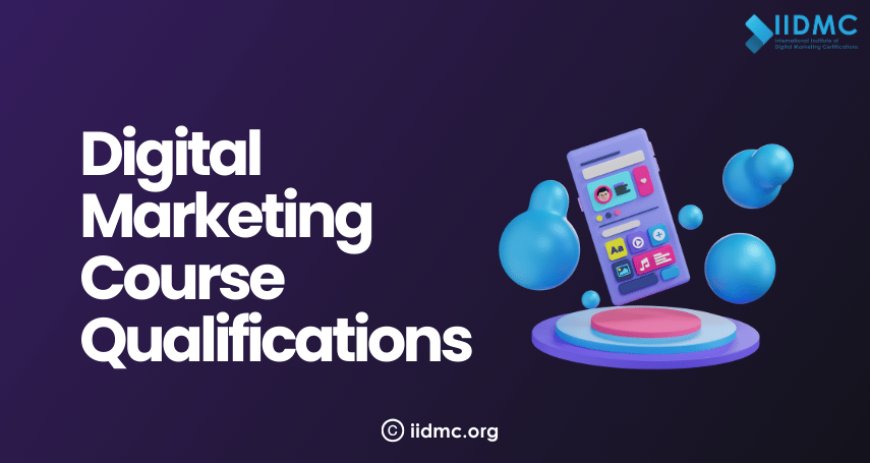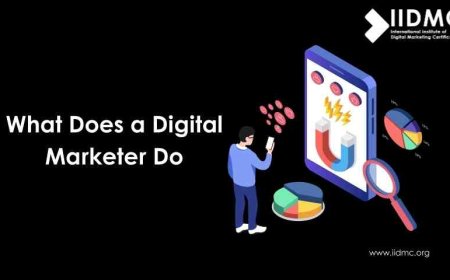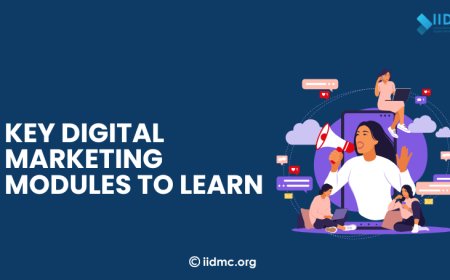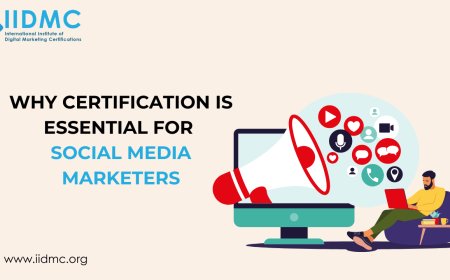Digital Marketing Course Qualifications: What You Should Know
Learn the essential qualifications for a digital marketing course, including the skills, certifications, and requirements to start your career in digital marketing.

When I first realized how much marketing had shifted to online platforms, I was amazed by the many new strategies and tools that businesses were using. It seemed like everything was happening on digital channels, from social media to websites and email campaigns. As a Certified digital marketing expert, I knew I had to understand these changes. At first, it felt overwhelming to figure out where to begin.
But as I started to explore digital marketing more deeply, I understood that it wasn’t about mastering everything at once. By focusing on understanding the basics, like how digital marketing strategies can help businesses grow, and identifying the skills needed, I realized that with the right training, anyone could succeed in this field. Getting the right qualifications and gaining hands-on experience through a digital marketing course set me on the path to a rewarding career.
Introduction to Digital Marketing
Digital marketing courses are designed to provide individuals with the knowledge and skills necessary to effectively market products and services in the online space. These courses cover key areas such as SEO, social media marketing, content creation, and data analysis, preparing you for the fast-paced world of digital marketing. Whether you're looking to transition into a new career or enhance your existing marketing knowledge.
Key Qualifications for Digital Marketing
While there are no strict formal qualifications required to enroll in digital marketing, having a basic understanding of marketing or business concepts can be beneficial. Some advanced courses may require prior knowledge in these areas, but most introductory courses are suitable for beginners.
The key qualifications for digital marketing typically include:
-
An interest in marketing and digital technology.
-
Basic knowledge of computers and the internet.
-
Analytical thinking and problem-solving skills.
Required Skills for Digital Marketing Professionals
To succeed as a digital marketing professional, you'll need a blend of technical, creative, and analytical skills. These include:
-
SEO Expertise: Knowledge of how to optimize websites and content for search engines.
-
Content Creation: Ability to create engaging content that resonates with target audiences.
-
Data Analysis: Proficiency in analyzing campaign performance using tools like Google Analytics.
-
Social Media Proficiency: Familiarity with various social media platforms and how to leverage them for business growth.
-
Email Marketing Skills: Expertise in crafting effective email campaigns to nurture leads and engage customers.
Educational Background for Digital Marketing Courses
Digital marketing courses are designed to cater to individuals from various educational backgrounds. While a degree in marketing, business, or communications can be helpful, it's not a strict requirement. Many digital marketing courses are open to high school graduates, college students, and working professionals looking to enhance their skills.
Courses are available for all levels, from beginners who need foundational knowledge to experienced marketers looking to refine their skills.
Certifications for Digital Marketing
Upon completing a digital marketing course, you can earn certifications that are widely recognized in the industry. Certifications validate your knowledge and skills, making you more attractive to employers. Popular digital marketing certifications include:
-
Certified Social Media Marketing Specialist – Teaches how to increase brand awareness and engage customers on platforms like Facebook, Instagram, LinkedIn, and Twitter.
-
Certified Digital Marketing Expert – Covers various digital marketing techniques like SEO, social media, content creation, email marketing, paid ads, and data analysis.
-
Certified SEO Expert – Focuses on improving website visibility through search engine optimization, including keyword research, on-page and off-page SEO, and link building.
-
Certified Google Ads Specialist – Provides skills to create and manage Google Ads campaigns, helping them perform better and drive more traffic.
-
Certified Content Marketing Specialist – Teaches how to create, share, and track content that attracts and keeps an audience engaged.
-
Certified Brand Reputation Management Specialist – Focuses on managing a brand’s online reputation by tracking mentions, handling customer feedback, and keeping the brand’s image positive.

These certifications help boost your credibility and enhance your career prospects.
Prerequisites for Digital Marketing
Mostly digital marketing does not require specialized prerequisites. However, certain skills and knowledge can enhance your learning experience:
-
Basic Computer Skills: Comfort using a computer and navigating online tools.
-
Creative Mindset: Ability to think outside the box and create compelling content.
-
Analytical Skills: Ability to interpret data and adjust strategies accordingly.
-
Interest in Digital Trends: A willingness to stay updated on the latest marketing trends and tools.
How to Choose the Right Digital Marketing Course
When selecting a digital marketing, consider the following factors:
-
Course Content: Ensure the course covers a wide range of digital marketing aspects such as SEO, social media marketing, and email marketing.
-
Instructor Experience: Choose courses taught by industry professionals with real-world experience.
-
Certification: Look for courses that provide certification upon completion.
-
Flexibility: Consider course duration and the flexibility it offers, especially if you're balancing work or other commitments.
-
Reputation: Research the course provider's reputation and student reviews.
Benefits of Completing a Digital Marketing Course
Completing digital marketing comes with numerous benefits:
-
Practical Skills: Gain hands-on experience with the latest digital marketing tools and techniques.
-
Career Advancement: Enhance your resume and improve job prospects in a competitive job market.
-
Industry Recognition: Obtain a recognized certification that validates your expertise.
-
Networking Opportunities: Connect with like-minded professionals and experts in the field.
-
Increased Earning Potential: Digital marketing professionals are in high demand, which can lead to higher salaries and job stability.
Career Opportunities After Digital Marketing Certification
A digital marketing certification opens the door to a variety of career opportunities, including:
-
Digital Marketing Manager: Oversee and execute marketing strategies for businesses.
-
SEO Specialist: Optimize websites and content for better search engine ranking.
-
Social Media Manager: Manage social media accounts and create strategies for online engagement.
-
Content marketing specialist: Develop content plans and create content to attract and retain customers.
-
PPC Specialist: Manage pay-per-click advertising campaigns across platforms like Google Ads.
-
Email Marketing Specialist: Design and implement email campaigns to nurture leads and engage customers.
These positions are available in various industries, including e-commerce, technology, healthcare, and finance, making digital marketing a versatile career choice. Taking a digital marketing course equips you with the skills needed to succeed in the online marketing world. By learning essential areas like SEO, content creation, social media, and data analysis, you can open up many career opportunities.
Completing a course also allows you to earn recognized certifications, which are highly valued by employers. Whether you’re just starting or looking to improve your skills, digital marketing training can help you advance your career, boost your job prospects, and set you up for success in this fast-growing industry.





























